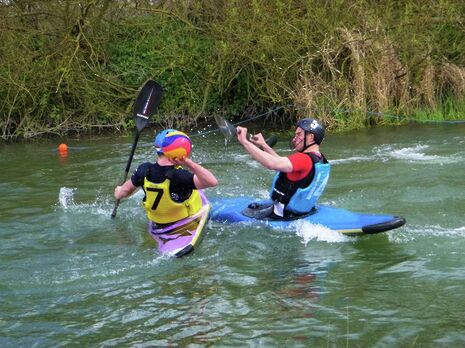Rogue Sport of the Week: Canoe Polo with Jon Wall
Keir Baker discusses the cold and wet world of Canoe Polo with the captain of Cambridge University Canoe Club

Athlete Profile
- Name: Jon Wall
- College: Queens’
- Degree: PhysNatSci – 3rd Year
- Hometown: Chelmsford
Jon Wall has been canoeing in a variety of disciplines since he was 14. He was a member of the canoe polo team that won the Varsity match against Oxford and was also part of the flatwater racing team that was unfortunate not to claim victory against Oxford too. He is the current captain of the Cambridge University Canoe Club.
How many different disciplines of canoeing exist?
Canoeing is one of those sports with a billion different disciplines, including freestyle, white-water racing, flatwater racing and canoe polo. The races can be a variety of different lengths too: flatwater racing can be sprinting or marathon races over much longer distances. As well as that, disciplines can differ in the amount of people in the boat: you can race on your own or with others alongside you, all the way up to a four-man crew.
Can you give us a brief summary of canoe polo?
Canoe polo is essentially water polo but in boats – though because you’re in a boat with a long stick it’s a bit more violent! Indeed, it’s very much a contact sport: you tackle people by pushing them over into the river. It’s a 5-a-side game with rolling subs, and there’s a maximum of eight per team. There’s no designated goalkeeper, but they’re usually tall as they have to stop the ball (about the size of a basketball) from going into the goal, which is about the same size as a door and raised a couple of metres off the surface of the water.
The pace of the game is quite like basketball – it’s very end-to-end – and the length of the pitch is usually the same size as a swimming pool, though it, of course, depends on the river you’re playing on.
How did you first get into the sport?
I had been kayaking with my local club in Chelmsford – which was one of the best clubs in the country for flatwater kayaking and sprinting, producing many top-quality paddlers who’ve been in and around the Team GB set-up – and I loved it, doing plenty of races. But when I arrived at university, I was keen to try canoe polo because it’s such a fast-paced game that offers something different from the usual canoeing training. It helped too that it was one of the sports that the team was looking to develop.
What is the hardest thing about canoe polo?
Well, it’s never nice to get your face dunked into a cold river, particularly in winter. Canoe polo is also quite a technical sport too: there are lots of techniques that can be initially hard for a beginner to pick up, though they come fast. The stamina required is obviously massive too!
What traits helps facilitate success in canoe polo?
It’s one of these sports where hand-eye coordination is really important, no matter where you’re playing. Physically, too, having a good sense of balance and strength all around the body is vital: even though it looks like a waist-up sport, most of the positioning comes from the entire body.
Who is the most famous athlete in your sport?
It’s difficult to say for canoe polo specifically because of the lack of exposure it gets. Sprint canoeing and kayaking, though, are, of course, Olympic sports, so Tim Brabants and Liam Heath – who’ve won medals for Team GB at various Olympic Games – are pretty well-known. A pair of Irish sprinters, the O’Donovan brothers, who won silver at Rio 2016, are quite famous too after their post-race interviews went viral!
What is the state of the sport in Cambridge, in the UK, and internationally?
We’re in excellent shape across the board here in Cambridge. We’ve had two members represents Team GB at under-21 level recently: Nathan Hammond was part of the team that won the under-21 World Championships while Jen McGaley is ranked fourth in the world for women’s freestyle. Over the last year, we’ve built up the competition aspect of the club. When I arrived at university, the canoe club was mostly focused on white-water stuff: the guys would journey off to rivers and try not to get killed, but this has changed over the years. It always does, because it depends on the skills of the personnel we have. Our canoe polo has come on leaps and bounds – we finally got a team out for the British University and Colleges Championships and finished in the top half, and had one of the top scorers too!
On a UK level, canoe polo is relatively unknown and it’s the sprinters that get all the attention and the funding, which is fair, given they’re winning medals. But canoe polo looks to have a bright future – the men’s team came seventh in the World Championships, bettering their aim of 12th, while at under-21’s level, the men came first and the women came fourth.
On an international level, it tends to be dominated by continental Europeans like France, Germany, and Spain, as well as other countries that are good at rowing. I’d love to see canoe polo as an Olympic sport, but I think there’ll be other canoe disciplines which get their place on the Olympic timetable first.
What is your training schedule like?
It’s one of those sports that’s tough to train on your own for. The University squad typically trains once a week – weather permitting – but this sometimes goes up to twice a week when we get closer to competitions. But the top guys, like those who compete for Team GB, they’ll still try and get out at least twice a week, even when the weather makes it’s tough. The emphasis is usually on sprinting because that’s a central element to canoe polo.
How do you reconcile a Cambridge workload and your training schedule?
For the Team GB guys, there’s a big reliance on training camps, where they’ll both go to the gym and get out on the water daily. They do the bulk of their year’s concentrated training at those training camps because there isn’t really sufficient people to train with, or indeed against, here at Cambridge. Indeed, there’s only a handful of canoe polo clubs nationally and the talent has been concentrated in them. So for them, coming to Cambridge for them is about maintenance and trying to stay at that level.
For me personally, I use canoe polo as a release from the stresses of work and make sure that it’s part of my downtime so it doesn’t interfere with my studies. I’m sure that’s pretty much the same as everyone else who plays Cambridge sport!
How might somebody interested in canoe polo get involved?
For those without a canoeing or kayaking background, we run a beginners’ course that will introduce people to canoeing and kayaking, to get them up to a level so that they’re safe on the water. It usually takes about a term, and from there, they can be confident enough to start to learn the rules of the game.
The easiest place to find out more is through our Facebook group, but if anyone has any specific questions about canoe polo they can email me (captain@cucanoe.co.uk).
This interview has been edited for length and clarity
 Features / Beyond reality checkpoint: local businesses risking being forced out by Cambridge’s tourism industry15 October 2025
Features / Beyond reality checkpoint: local businesses risking being forced out by Cambridge’s tourism industry15 October 2025 News / Join Varsity this Michaelmas13 October 2025
News / Join Varsity this Michaelmas13 October 2025 News / News in Brief: good deeds, gripes, and Gardies gifts14 October 2025
News / News in Brief: good deeds, gripes, and Gardies gifts14 October 2025 Comment / Bonnie Blue is the enemy, not the face, of female liberation13 October 2025
Comment / Bonnie Blue is the enemy, not the face, of female liberation13 October 2025 News / Cambridge climbs to third in world Uni rankings11 October 2025
News / Cambridge climbs to third in world Uni rankings11 October 2025










